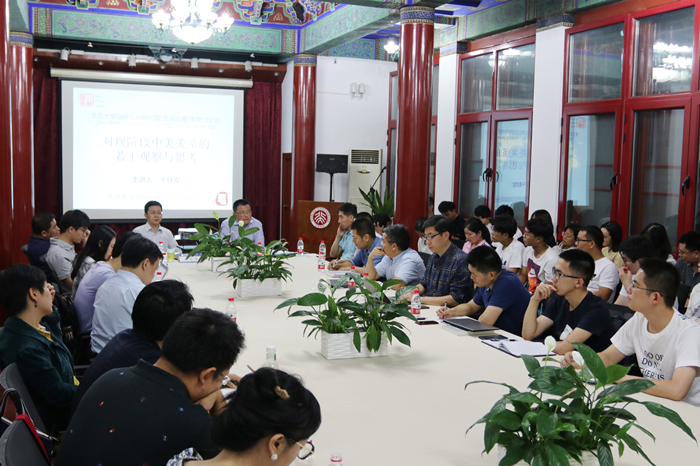The 38th session of the “North Pavilion Dialogue” lecture series was held by the Institute of International and Strategic Studies (IISS), Peking University (PKU) on the evening of September 25th, 2019. Mr. Yu Tiejun, Associate Professor of the School of International Studies (SIS), Peking University (PKU) and Vice President of IISS, PKU, delivered a lecture entitled “A Few Observations and Reflections upon the Current Sino-U.S. Relations”. The lecture was hosted by Mr. Gui Yongtao, Vice President of IISS, PKU and Vice President of SIS, PKU.
In his lecture, Mr. Yu Tiejun analyzed the following four issues: the new paradigm of Sino-U.S. relations, the background of and reasons for the paradigm shift in the China-U.S. relations, the current debates within the United States on the U.S. foreign policy towards China, and the future of Sino-U.S. relations as well as China’s relevant policy responses. Mr. Yu Tiejun believes that Sino-U.S. relations have deteriorated in recent years due to several factors, including changes in the international system, a shift of balance of power between China and the United States, misperception of each other by both sides, shifts in the dynamics of the respective domestic politics in China and the United States, and differences in the leadership characters and styles of the current Chinese and American leaders. A series of official documents issued by the U.S. government, along with a series of foreign policies and actions towards China adopted by it in the past two years have clearly indicated that competition among major global powers has replaced counter-terrorism as a top priority on the U.S. national security agenda, and that China and the Asia-Pacific region have replaced Russia and Europe respectively as the country and region of primary concern in the foreign policy strategies of the U.S. government, marking an unprecedented change in the U.S. foreign policy since the end of the World War II. At present, there has been a general consensus among the current U.S. policy-makers and elites on the theory of “China threat”, but no consensus has yet been reached on the specific extent of the threat China poses to the United States, as well as how to deal with China’s threats. This can be observed in the still ongoing strategic debates within the academic and policy-making communities of the United States.

Regarding the future of China-U.S. relations, Yu Tiejun believes that since the previously-mentioned reasons for the deterioration of Sino-U.S. relations will still exist, the Sino-U.S. relations will, in the absence of any major political and economic instabilities both in China and the United States, or with no occurrence of major crises in international community, likely be characterized by full-scale competition for a considerable period of time in the future. At present, the key focus of China’s policy towards the United States is to manage bilateral relations, promote bilateral cooperation in the areas of mutual interests of both countries, prevent vicious competition between China and the United States, and try to avoid any further extension and escalation of competition to the military and security level. Therefore, China’s foreign policies towards the United States should be further centred upon clear positioning and objective evaluation of such bilateral relations, calm and measured policy responses to relevant matters, and implementation of comprehensive policies, so as to keep the Sino-U.S. relations within a stable and controllable framework and create a favourable external environment to facilitate China’s peaceful development.
(Contributed by: Mo Yufei)
Editor: Li Fangqi Photographer: Zheng Peijie

